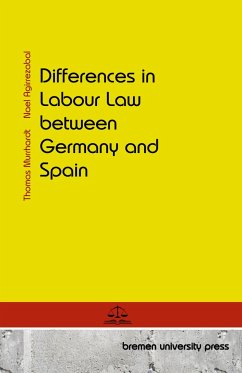
Differences in Labour Law between Germany and Sweden
Versandkostenfrei!
Versandfertig in 1-2 Wochen
30,00 €
inkl. MwSt.

PAYBACK Punkte
0 °P sammeln!
In a constantly changing global world of work, national differences in labour law are becoming increasingly important. This book offers a well-founded and detailed comparison between German and Swedish labour law, highlighting the central principles, structures and regulations of both countries. It analyses the role of collective agreements, protection against dismissal, employee co-determination and the flexibility of the labour market. While German labour law is characterised by strict regulation and comprehensive protection against dismissal, the Swedish model takes a more liberal approach ...
In a constantly changing global world of work, national differences in labour law are becoming increasingly important. This book offers a well-founded and detailed comparison between German and Swedish labour law, highlighting the central principles, structures and regulations of both countries. It analyses the role of collective agreements, protection against dismissal, employee co-determination and the flexibility of the labour market. While German labour law is characterised by strict regulation and comprehensive protection against dismissal, the Swedish model takes a more liberal approach with a stronger emphasis on social security and economic adaptability. This comparison makes it clear how two different legal systems in Europe react to similar challenges and what advantages and disadvantages result for employees and employers. The book is aimed at anyone who wants to gain a deeper understanding of the labour law systems in Germany and Sweden. It shows in a practical way how these two models are organised and what lessons can be learned from their differences.












